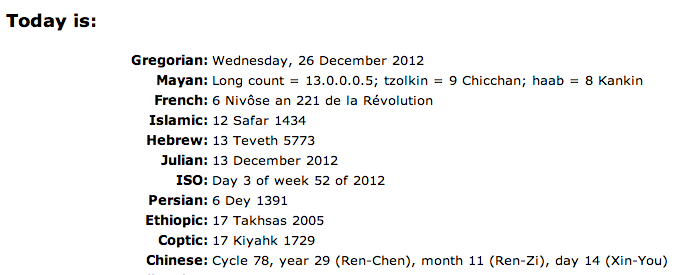
How long has our calendar been around?
We are writing this on 12/26/12 or Wednesday, December 26, 2012. Traditionally understood as two-thousand and twelve years (give or take a few) after Jesus Christ is believed to have been born. But if Jesus used a calendar, it would not have been the one we use.
Our calendar is called the Gregorian calendar and was instituted by Pope Gregory XIII in 1582. There are many other calendars. Quite a few societies have used calendars linked to the years their kings ruled. And there are numerous calendars, beyond the Gregorian calendar, that are still in use today. For example, 2012 equates to 1434/35 in the Islamic calendar and 5772-73 in the Jewish calendar (both are lunar, based on the cycles of the moon).
B.C. or B.C.E.?
Many people use the abbreviations B.C. and A.D. with a year (for example, A.D. 2012). B.C. refers to “Before Christ,” and the initials, A.D., stand for Anno Domini, which is Latin for “In the year of our Lord.” This system was devised by a monk in the year 525.
A more recent system uses B.C.E. which stands for “Before the Common Era” and C.E. for “Common Era.” This newer system is now widely used as a way of expressing the same periods as B.C. and A.D., but without the Christian reference. According to these systems, we count time backwards Before the Common Era (B.C.E.) and forwards in the Common Era (C.E.).
Circa?
Often dates will be preceded with a “c.” or a “ca.” These are abbreviations of the Latin word “circa” which means around, or approximately. We use this before a date to indicate that we do not know exactly when something happened, so c. 400 B.C.E. means approximately 400 years Before the Common Era.
Why 2012 is in the 21st Century
We live in the 21st Century, that is, the 2000s. Similarly when we say “20th Century,” we are referring to the 1900s. All this because, according to the calendar we use, the 1st Century included the years 1-100 (there was no year zero), and the 2nd Century, the years 101-200. Similarly, when we say 2nd Century B.C.E. we are referring to the years 101-200 B.C.E.
Within our calendar, we also have a tendency to find portentous meaning in the millennial years, that is, in the years 1000 and more recently, 2000.

